Karma in Hinduism
VerifiedAdded on 2023/06/03
|5
|1345
|145
AI Summary
This essay explores the concept of Karma in Hinduism and its impact on an individual's life. It discusses the relationship between Karma and Dharma and how Karma influences the aspect of reincarnation. The essay also highlights the role of fate in the process of reincarnation.
Contribute Materials
Your contribution can guide someone’s learning journey. Share your
documents today.
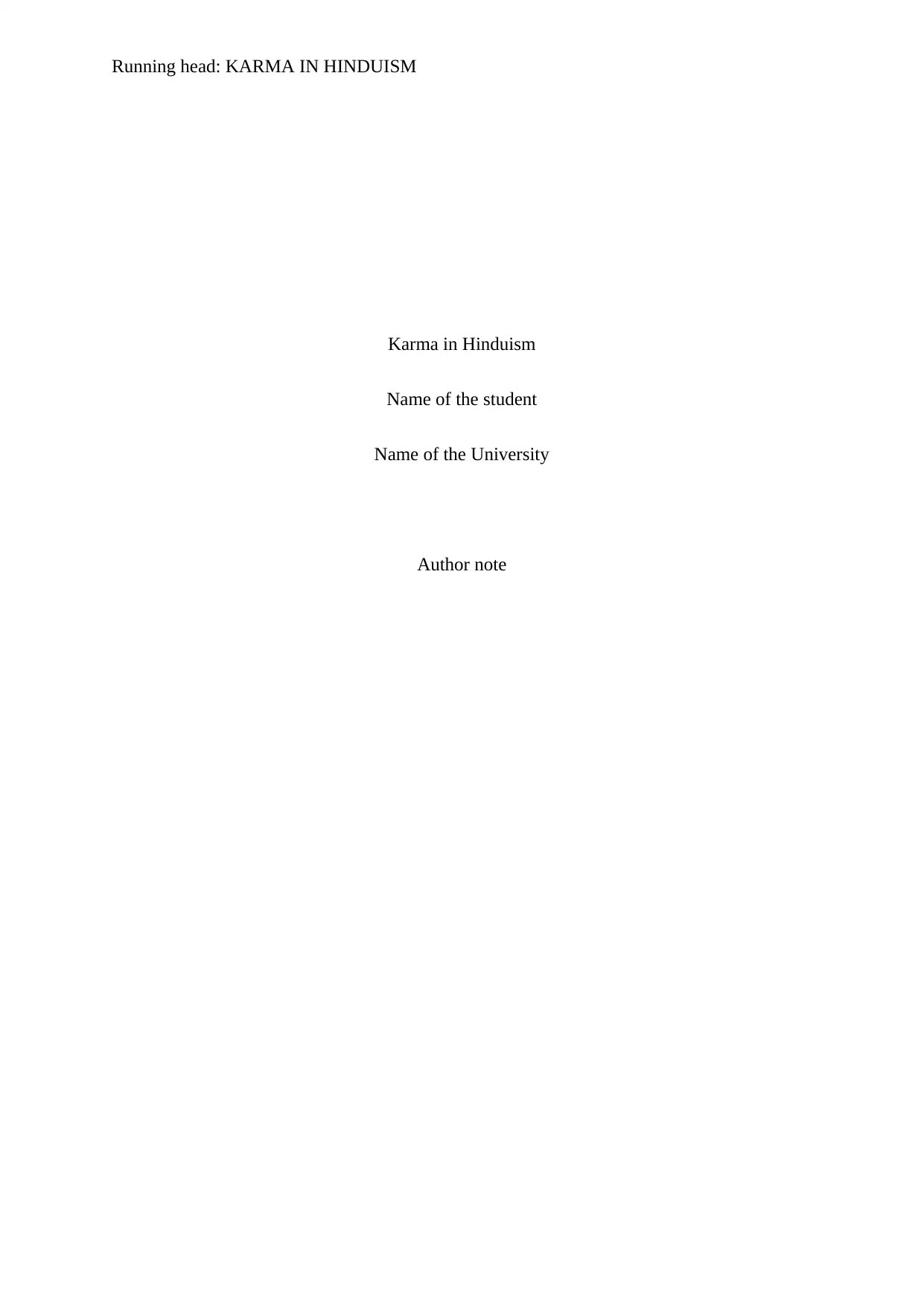
Running head: KARMA IN HINDUISM
Karma in Hinduism
Name of the student
Name of the University
Author note
Karma in Hinduism
Name of the student
Name of the University
Author note
Secure Best Marks with AI Grader
Need help grading? Try our AI Grader for instant feedback on your assignments.
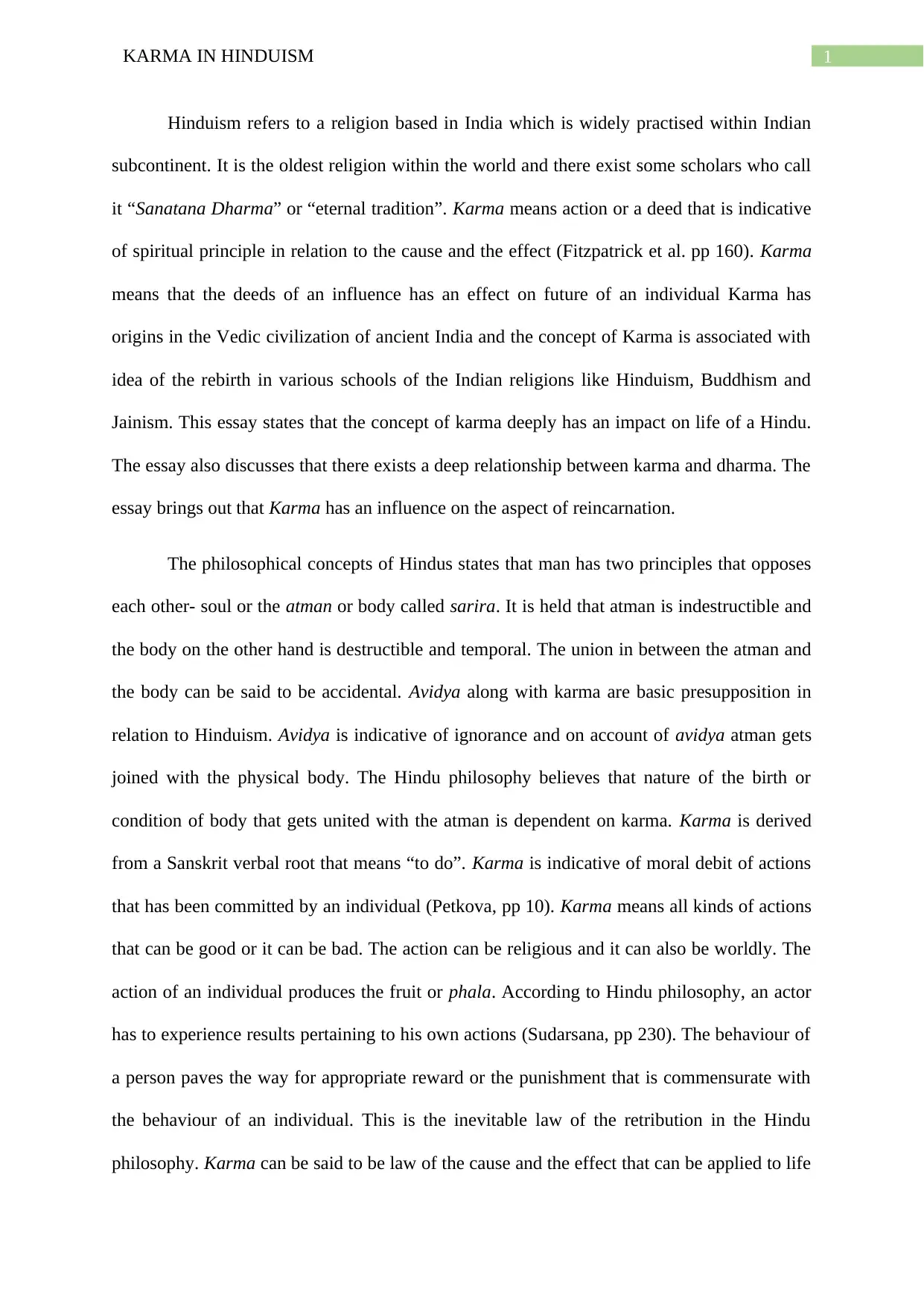
1KARMA IN HINDUISM
Hinduism refers to a religion based in India which is widely practised within Indian
subcontinent. It is the oldest religion within the world and there exist some scholars who call
it “Sanatana Dharma” or “eternal tradition”. Karma means action or a deed that is indicative
of spiritual principle in relation to the cause and the effect (Fitzpatrick et al. pp 160). Karma
means that the deeds of an influence has an effect on future of an individual Karma has
origins in the Vedic civilization of ancient India and the concept of Karma is associated with
idea of the rebirth in various schools of the Indian religions like Hinduism, Buddhism and
Jainism. This essay states that the concept of karma deeply has an impact on life of a Hindu.
The essay also discusses that there exists a deep relationship between karma and dharma. The
essay brings out that Karma has an influence on the aspect of reincarnation.
The philosophical concepts of Hindus states that man has two principles that opposes
each other- soul or the atman or body called sarira. It is held that atman is indestructible and
the body on the other hand is destructible and temporal. The union in between the atman and
the body can be said to be accidental. Avidya along with karma are basic presupposition in
relation to Hinduism. Avidya is indicative of ignorance and on account of avidya atman gets
joined with the physical body. The Hindu philosophy believes that nature of the birth or
condition of body that gets united with the atman is dependent on karma. Karma is derived
from a Sanskrit verbal root that means “to do”. Karma is indicative of moral debit of actions
that has been committed by an individual (Petkova, pp 10). Karma means all kinds of actions
that can be good or it can be bad. The action can be religious and it can also be worldly. The
action of an individual produces the fruit or phala. According to Hindu philosophy, an actor
has to experience results pertaining to his own actions (Sudarsana, pp 230). The behaviour of
a person paves the way for appropriate reward or the punishment that is commensurate with
the behaviour of an individual. This is the inevitable law of the retribution in the Hindu
philosophy. Karma can be said to be law of the cause and the effect that can be applied to life
Hinduism refers to a religion based in India which is widely practised within Indian
subcontinent. It is the oldest religion within the world and there exist some scholars who call
it “Sanatana Dharma” or “eternal tradition”. Karma means action or a deed that is indicative
of spiritual principle in relation to the cause and the effect (Fitzpatrick et al. pp 160). Karma
means that the deeds of an influence has an effect on future of an individual Karma has
origins in the Vedic civilization of ancient India and the concept of Karma is associated with
idea of the rebirth in various schools of the Indian religions like Hinduism, Buddhism and
Jainism. This essay states that the concept of karma deeply has an impact on life of a Hindu.
The essay also discusses that there exists a deep relationship between karma and dharma. The
essay brings out that Karma has an influence on the aspect of reincarnation.
The philosophical concepts of Hindus states that man has two principles that opposes
each other- soul or the atman or body called sarira. It is held that atman is indestructible and
the body on the other hand is destructible and temporal. The union in between the atman and
the body can be said to be accidental. Avidya along with karma are basic presupposition in
relation to Hinduism. Avidya is indicative of ignorance and on account of avidya atman gets
joined with the physical body. The Hindu philosophy believes that nature of the birth or
condition of body that gets united with the atman is dependent on karma. Karma is derived
from a Sanskrit verbal root that means “to do”. Karma is indicative of moral debit of actions
that has been committed by an individual (Petkova, pp 10). Karma means all kinds of actions
that can be good or it can be bad. The action can be religious and it can also be worldly. The
action of an individual produces the fruit or phala. According to Hindu philosophy, an actor
has to experience results pertaining to his own actions (Sudarsana, pp 230). The behaviour of
a person paves the way for appropriate reward or the punishment that is commensurate with
the behaviour of an individual. This is the inevitable law of the retribution in the Hindu
philosophy. Karma can be said to be law of the cause and the effect that can be applied to life
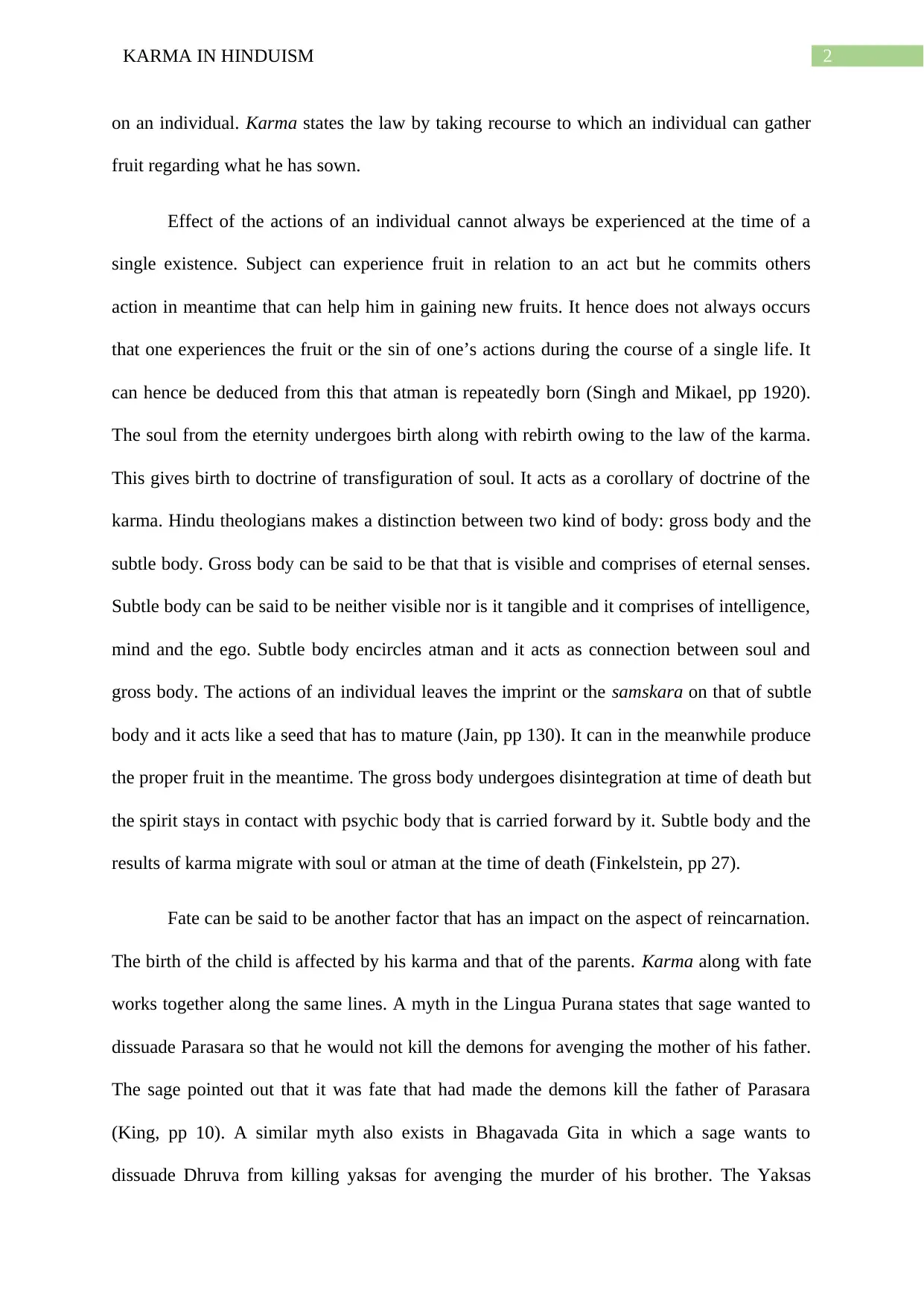
2KARMA IN HINDUISM
on an individual. Karma states the law by taking recourse to which an individual can gather
fruit regarding what he has sown.
Effect of the actions of an individual cannot always be experienced at the time of a
single existence. Subject can experience fruit in relation to an act but he commits others
action in meantime that can help him in gaining new fruits. It hence does not always occurs
that one experiences the fruit or the sin of one’s actions during the course of a single life. It
can hence be deduced from this that atman is repeatedly born (Singh and Mikael, pp 1920).
The soul from the eternity undergoes birth along with rebirth owing to the law of the karma.
This gives birth to doctrine of transfiguration of soul. It acts as a corollary of doctrine of the
karma. Hindu theologians makes a distinction between two kind of body: gross body and the
subtle body. Gross body can be said to be that that is visible and comprises of eternal senses.
Subtle body can be said to be neither visible nor is it tangible and it comprises of intelligence,
mind and the ego. Subtle body encircles atman and it acts as connection between soul and
gross body. The actions of an individual leaves the imprint or the samskara on that of subtle
body and it acts like a seed that has to mature (Jain, pp 130). It can in the meanwhile produce
the proper fruit in the meantime. The gross body undergoes disintegration at time of death but
the spirit stays in contact with psychic body that is carried forward by it. Subtle body and the
results of karma migrate with soul or atman at the time of death (Finkelstein, pp 27).
Fate can be said to be another factor that has an impact on the aspect of reincarnation.
The birth of the child is affected by his karma and that of the parents. Karma along with fate
works together along the same lines. A myth in the Lingua Purana states that sage wanted to
dissuade Parasara so that he would not kill the demons for avenging the mother of his father.
The sage pointed out that it was fate that had made the demons kill the father of Parasara
(King, pp 10). A similar myth also exists in Bhagavada Gita in which a sage wants to
dissuade Dhruva from killing yaksas for avenging the murder of his brother. The Yaksas
on an individual. Karma states the law by taking recourse to which an individual can gather
fruit regarding what he has sown.
Effect of the actions of an individual cannot always be experienced at the time of a
single existence. Subject can experience fruit in relation to an act but he commits others
action in meantime that can help him in gaining new fruits. It hence does not always occurs
that one experiences the fruit or the sin of one’s actions during the course of a single life. It
can hence be deduced from this that atman is repeatedly born (Singh and Mikael, pp 1920).
The soul from the eternity undergoes birth along with rebirth owing to the law of the karma.
This gives birth to doctrine of transfiguration of soul. It acts as a corollary of doctrine of the
karma. Hindu theologians makes a distinction between two kind of body: gross body and the
subtle body. Gross body can be said to be that that is visible and comprises of eternal senses.
Subtle body can be said to be neither visible nor is it tangible and it comprises of intelligence,
mind and the ego. Subtle body encircles atman and it acts as connection between soul and
gross body. The actions of an individual leaves the imprint or the samskara on that of subtle
body and it acts like a seed that has to mature (Jain, pp 130). It can in the meanwhile produce
the proper fruit in the meantime. The gross body undergoes disintegration at time of death but
the spirit stays in contact with psychic body that is carried forward by it. Subtle body and the
results of karma migrate with soul or atman at the time of death (Finkelstein, pp 27).
Fate can be said to be another factor that has an impact on the aspect of reincarnation.
The birth of the child is affected by his karma and that of the parents. Karma along with fate
works together along the same lines. A myth in the Lingua Purana states that sage wanted to
dissuade Parasara so that he would not kill the demons for avenging the mother of his father.
The sage pointed out that it was fate that had made the demons kill the father of Parasara
(King, pp 10). A similar myth also exists in Bhagavada Gita in which a sage wants to
dissuade Dhruva from killing yaksas for avenging the murder of his brother. The Yaksas
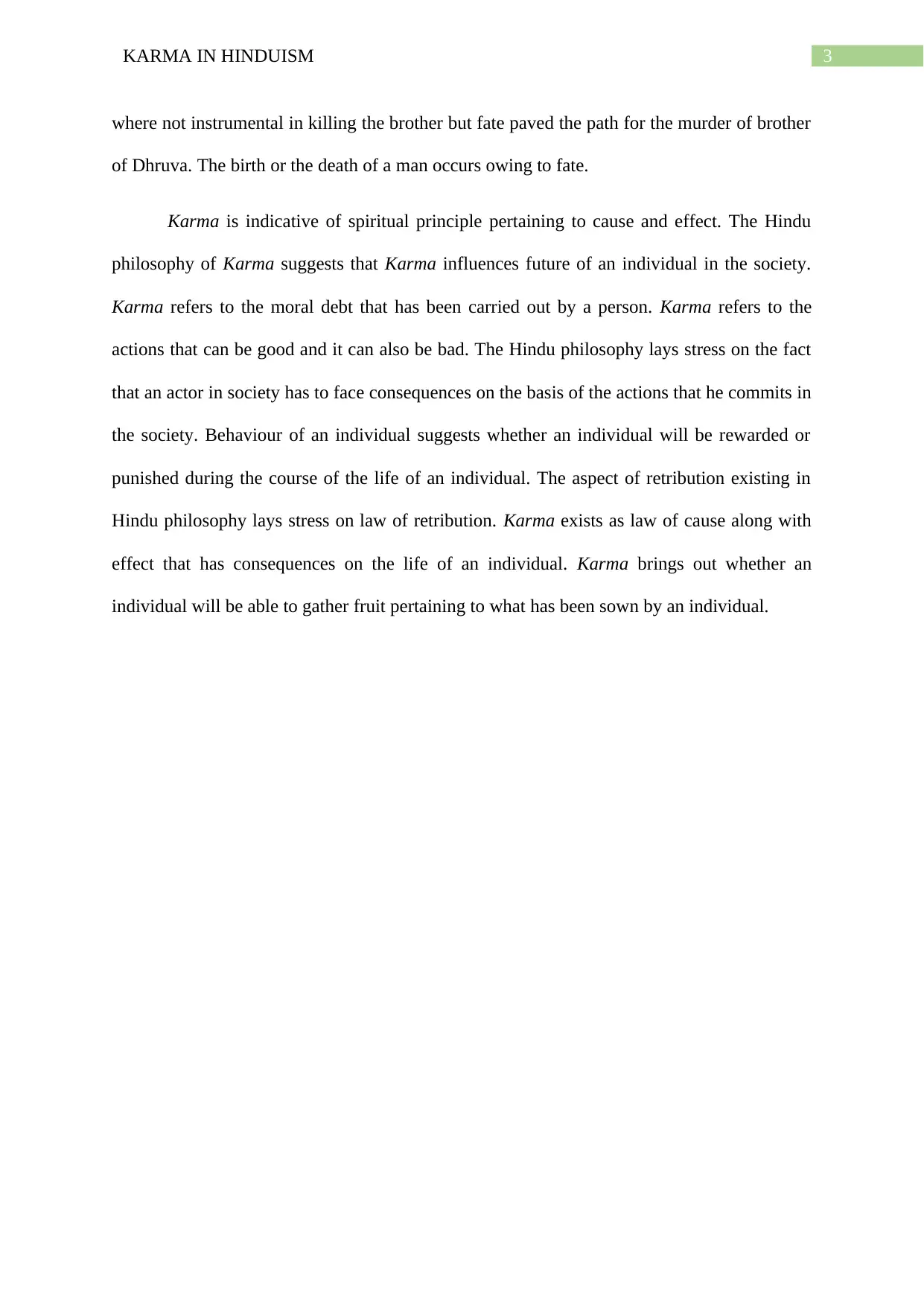
3KARMA IN HINDUISM
where not instrumental in killing the brother but fate paved the path for the murder of brother
of Dhruva. The birth or the death of a man occurs owing to fate.
Karma is indicative of spiritual principle pertaining to cause and effect. The Hindu
philosophy of Karma suggests that Karma influences future of an individual in the society.
Karma refers to the moral debt that has been carried out by a person. Karma refers to the
actions that can be good and it can also be bad. The Hindu philosophy lays stress on the fact
that an actor in society has to face consequences on the basis of the actions that he commits in
the society. Behaviour of an individual suggests whether an individual will be rewarded or
punished during the course of the life of an individual. The aspect of retribution existing in
Hindu philosophy lays stress on law of retribution. Karma exists as law of cause along with
effect that has consequences on the life of an individual. Karma brings out whether an
individual will be able to gather fruit pertaining to what has been sown by an individual.
where not instrumental in killing the brother but fate paved the path for the murder of brother
of Dhruva. The birth or the death of a man occurs owing to fate.
Karma is indicative of spiritual principle pertaining to cause and effect. The Hindu
philosophy of Karma suggests that Karma influences future of an individual in the society.
Karma refers to the moral debt that has been carried out by a person. Karma refers to the
actions that can be good and it can also be bad. The Hindu philosophy lays stress on the fact
that an actor in society has to face consequences on the basis of the actions that he commits in
the society. Behaviour of an individual suggests whether an individual will be rewarded or
punished during the course of the life of an individual. The aspect of retribution existing in
Hindu philosophy lays stress on law of retribution. Karma exists as law of cause along with
effect that has consequences on the life of an individual. Karma brings out whether an
individual will be able to gather fruit pertaining to what has been sown by an individual.
Secure Best Marks with AI Grader
Need help grading? Try our AI Grader for instant feedback on your assignments.
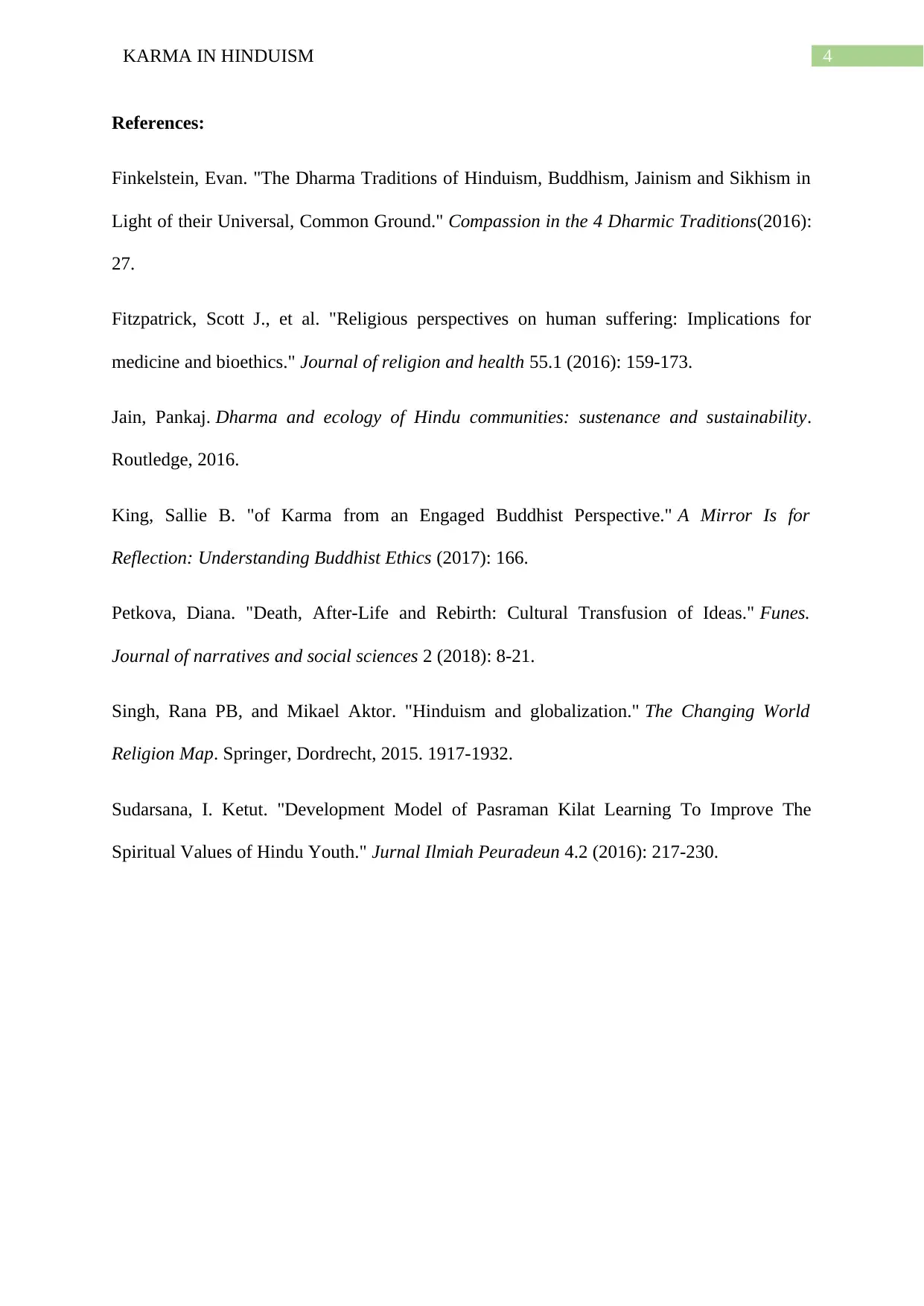
4KARMA IN HINDUISM
References:
Finkelstein, Evan. "The Dharma Traditions of Hinduism, Buddhism, Jainism and Sikhism in
Light of their Universal, Common Ground." Compassion in the 4 Dharmic Traditions(2016):
27.
Fitzpatrick, Scott J., et al. "Religious perspectives on human suffering: Implications for
medicine and bioethics." Journal of religion and health 55.1 (2016): 159-173.
Jain, Pankaj. Dharma and ecology of Hindu communities: sustenance and sustainability.
Routledge, 2016.
King, Sallie B. "of Karma from an Engaged Buddhist Perspective." A Mirror Is for
Reflection: Understanding Buddhist Ethics (2017): 166.
Petkova, Diana. "Death, After-Life and Rebirth: Cultural Transfusion of Ideas." Funes.
Journal of narratives and social sciences 2 (2018): 8-21.
Singh, Rana PB, and Mikael Aktor. "Hinduism and globalization." The Changing World
Religion Map. Springer, Dordrecht, 2015. 1917-1932.
Sudarsana, I. Ketut. "Development Model of Pasraman Kilat Learning To Improve The
Spiritual Values of Hindu Youth." Jurnal Ilmiah Peuradeun 4.2 (2016): 217-230.
References:
Finkelstein, Evan. "The Dharma Traditions of Hinduism, Buddhism, Jainism and Sikhism in
Light of their Universal, Common Ground." Compassion in the 4 Dharmic Traditions(2016):
27.
Fitzpatrick, Scott J., et al. "Religious perspectives on human suffering: Implications for
medicine and bioethics." Journal of religion and health 55.1 (2016): 159-173.
Jain, Pankaj. Dharma and ecology of Hindu communities: sustenance and sustainability.
Routledge, 2016.
King, Sallie B. "of Karma from an Engaged Buddhist Perspective." A Mirror Is for
Reflection: Understanding Buddhist Ethics (2017): 166.
Petkova, Diana. "Death, After-Life and Rebirth: Cultural Transfusion of Ideas." Funes.
Journal of narratives and social sciences 2 (2018): 8-21.
Singh, Rana PB, and Mikael Aktor. "Hinduism and globalization." The Changing World
Religion Map. Springer, Dordrecht, 2015. 1917-1932.
Sudarsana, I. Ketut. "Development Model of Pasraman Kilat Learning To Improve The
Spiritual Values of Hindu Youth." Jurnal Ilmiah Peuradeun 4.2 (2016): 217-230.
1 out of 5
Related Documents
Your All-in-One AI-Powered Toolkit for Academic Success.
+13062052269
info@desklib.com
Available 24*7 on WhatsApp / Email
![[object Object]](/_next/static/media/star-bottom.7253800d.svg)
Unlock your academic potential
© 2024 | Zucol Services PVT LTD | All rights reserved.





